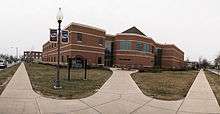Winebrenner Theological Seminary
| Motto | χριστω και εκκλησια (To Christ and to Church) |
|---|---|
| Type | Private |
| Established | 1942 |
| Affiliation | Churches of God General Conference |
| President | Brent C. Sleasman |
| Location |
Findlay, Ohio, USA 41°03′09″N 83°39′02″W / 41.0525°N 83.650556°WCoordinates: 41°03′09″N 83°39′02″W / 41.0525°N 83.650556°W |
| Colors | Blue and Red |
| Website | www.winebrenner.edu |

Winebrenner Theological Seminary (WTS) was established in 1942 as a graduate school of theology of Findlay College (renamed The University of Findlay in 1989). In 1961, WTS received its charter from the state of Ohio, to become an independent, degree-granting institution.
WTS was founded by the Churches of God, General Conference (CGGC), an evangelical denomination headquartered in Findlay, Ohio. The Seminary derives its name from the founder of the denomination, John Winebrenner, who established the group in 1825 in Harrisburg, Pennsylvania.
WTS continues to serve the CGGC as its sole seminary as well as students from 35 different denominational backgrounds. WTS is accredited by the Association of Theological Schools in the United States and Canada (ATS) and the Higher Learning Commission of Higher Education of the North Central Association of Colleges and Schools. Winebrenner offers four masters programs, a Doctor of Ministry program and collaborates with The University of Findlay to offer a Bachelor of Arts in Religious Studies program.
Winebrenner’s Mission Statement
Winebrenner Theological Seminary serves God’s mission of reconciliation in changing the world by preparing servants of the Lord Jesus Christ for effective ministry in the Church and the world.
Corresponding Values
Winebrenner Theological Seminary's academic program is predicated upon a belief in the supremacy of the triune God, the uniqueness of the Lord Jesus Christ, and the authority of Scripture. In consequence, its stated mission is the inculcation of the following values:
- Theological preparation and application for ministry
- Spiritual formation for individuals and communities
- Evangelism and discipleship
- Leadership development
- Community life among students, faculty, administration, and staff
- Broad evangelical unity